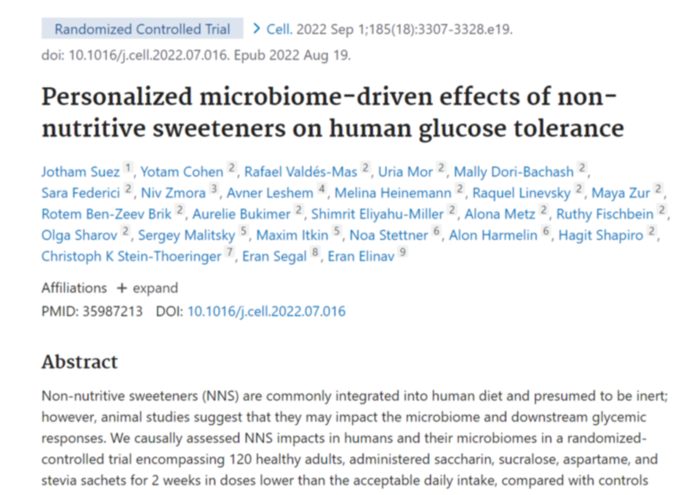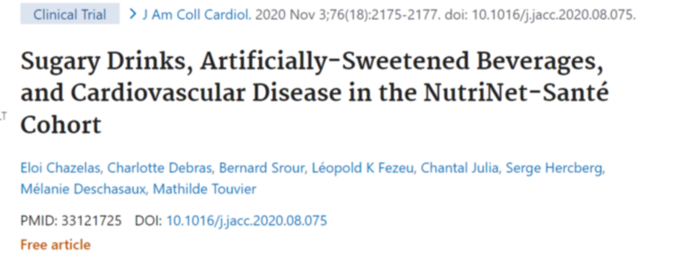Sugar-free is not sugar-free, will there be health risks if you drink it for a long time?

[ad_1]
“Sugar-free is healthier” seems to be becoming a concept recognized by more people. Therefore, sugar-free drinks with added sugar are becoming more and more accessible, and more and more consumers who pursue health are willing to pay for it.
The Paper reporter noticed that in recent years, the health risks of sugar-free drinks have repeatedly appeared on the hot search list, and sparked public discussions: “Why are sugar-free drinks more harmful than sugar-filled drinks?” “What are the risks of drinking sugar-free drinks for a long time?” harm?”
Why have sugar-free drinks with added sugar become the “target” of health controversy? Are sugar-free drinks healthier, or less healthy?
From sugar to sugar-free, the nutritional concept of Chinese residents has changed
In a broad sense, sugar is a kind of carbohydrate, which exists not only in foods with sugar in the name such as white sugar and brown sugar, but also in common foods such as steamed buns, rice, pastries, and fruits. The so-called sugar-containing drinks or sugar-free drinks are generally It depends on whether it has additional added sugar.
As early as 1989, my country released the “Dietary Guidelines for Chinese Residents” for the first time, and revised them in 1997, 2007, and 2016. The latest guideline released in 2022 is the fifth version. The constantly updated guideline is not only a suggestion for a healthy diet for the people, but also reflects the changes in the nutritional circles and the public’s perception of various nutrients over the years.
Source: Official website of Chinese Nutrition Society
Take added sugar as an example. Although the 2007 edition mentions “drink enough water every day and choose beverages reasonably”, it does not put forward requirements on the intake of sugar. According to the record of the meeting of the Ministry of Health’s special conference on China.com at that time, experts explained: “From the perspective of dietary structure, our sugar intake is very small, not as much as in the West.” But in the 2016 and 2022 editions , The guidelines all emphasize “sugar control and alcohol restriction”, and propose to control the intake of added sugar, the daily intake should not exceed 50g, preferably below 25g.
“When I was in college, an old professor said in a public nutrition course that we Chinese still eat very little added sugar, so there is no need to think about it.” During the interview, the reporter introduced that the 1997 version of the dietary guidelines did not mention “added sugar”. In 2007, the domestic guidelines mentioned the issue of “reasonable exercise and obesity control”. “Added sugar” is mentioned in the ingredients, and the World Health Organization has also issued guidelines on controlling the intake of “free sugar”. In the past ten years, people have paid more and more attention to the matter of “sugar”, and realized that it is necessary to control sugar and reduce sugar. It is also against this background that sugar-free drinks have begun to be admired.
The promotion of sugar-free drinks has not continued. In recent years, the health risks of sugar-free drinks have been frequently mentioned.
Drinking sugar-free drinks for a long time may also have health risks
Published research findings on the health risks of diet drinks are not uncommon.
On February 28 this year, a study published in the British journal Nature Medicine suggested that erythritol, a commonly used artificial sweetener, may be associated with heart disease events. Researchers at the Cleveland Clinic in the United States conducted a preliminary study in 1157 people who had been assessed for heart disease risk and had 3-year outcome data. By analyzing the chemicals in the blood, the team observed that levels of several artificial sweetener compounds, especially erythritol, were associated with an increased risk of future heart disease and stroke during the three-year follow-up.
The team also conducted another experiment and found that erythritol had an effect on the increased risk of blood clots. After 8 healthy volunteers ingested 30 grams of erythritol beverage, the researchers tested their plasma levels and found that the erythritol levels of all volunteers continued to increase, exceeding the threshold of increased risk of blood clotting in 2-3 days . The researchers believe this finding may indicate that elevated levels of erythritol are associated with an increased risk of blood clots. However, they also point out that the prevalence of cardiovascular risk factors in the study’s array was high, and it remains to be confirmed whether similar results can be observed in longer-term follow-up of apparently healthy subjects.
A large 2020 study published in the Journal of the American College of Cardiology (JACC) also showed that artificial sweeteners may be linked to the risk of cardiovascular disease. After 10 years of follow-up of more than 100,000 subjects, the study found that compared with those who did not drink artificially sweetened beverages, those who drank the most artificially sweetened beverages (median 176.7 ml per day) Disease risk increased by 32%. The study also suggests that sugar substitute drinks are not a healthy alternative.
In addition to potentially increasing the risk of cardiovascular disease, sugar substitutes may also affect a person’s blood sugar levels. In August 2022, a research paper published in the journal “Cell” pointed out that some sugar substitutes will not only affect the microbial composition of the human body, but also affect the molecules in the peripheral blood circulation, which in turn will affect the individual’s tolerance to glucose.

Cell Research Paper
In December 2019, a paper published in Diabetes Care, a journal of the American Diabetes Association, analyzed the data of nearly 200,000 people tracked for more than 20 years, and also pointed to the risk of diabetes behind sugar substitute drinks. The findings showed that switching from sugar-sweetened beverages to drinking artificially sweetened, zero-calorie/low-calorie sugar substitute beverages did not change the risk of diabetes in these individuals, and the best option was to drink directly without sweeteners Tea, coffee, milk, etc.

Journal of the American College of Cardiology research paper
How to understand the health risks of drinking sugar-free drinks for a long time?
Previously, Professor Mu Yiming, Chief Physician of the Department of Endocrinology of the First Medical Center of the Chinese People’s Liberation Army General Hospital, also said in an interview with the media: “Many studies have found that if you drink sugar-free drinks for a long time, if it is sweetened, such as Like sucralose, aspartame, xylitol, etc., these sweetened sugar substitute drinks are not essentially different from sugary drinks in causing diabetes. On the contrary, these sugar-free, sweet drinks , may be more harmful than our drinking of sweetened sugary drinks in terms of diabetes and cardiovascular disease.”
Regarding the mechanism of the health risks of sugar-free drinks, Mu Yoshiaki introduced in an interview with The Paper that at present, the academic circle is not very clear about the exact mechanism behind it. Only from the current research or literature, there are several generally accepted explanations , one of which is that although the sweetness of sugar-free drinks is not really added with sugar, but with synthetic or natural sweeteners, the taste of sweetness itself stimulates the brain, making people more appetite and eat more things, including Other sweets, over time, lead to weight gain, even obesity, a high risk factor for many diseases. In addition, when a person starts to eat more sweets, it also leads to poorer insulin responsiveness to glucose in the long-term, which eventually leads to insulin resistance, which in turn manifests as elevated blood sugar.
It is worth mentioning that on social platforms, some diabetic patients can measure blood sugar levels at different times after drinking sugar-free drinks, and then judge the impact of a drink on blood sugar and health. In this regard, Mu Yoshiaki emphasized that sugar-free drinks themselves have no energy or very low energy, and drinking once will indeed not cause blood sugar to rise like sugar-containing drinks. The current emphasis on the potential risks of sugar-free drinks is mostly based on the premise of long-term drinking in large quantities. “The long-term is based on the year, and the current research is also based on the conclusion of the year.” Means no long-term risk.
Gu Zhongyi expressed a similar view. He pointed out that the discussion of whether sugar-free drinks are healthy or not mainly depends on their long-term effects, such as the impact on chronic diseases such as diabetes. A person’s health is affected by many factors. From the perspective of overall human health intervention, sugar-free drinks may only be a small aspect, and the impact is not particularly large. Specifically judging whether a drink is healthier or less healthy depends on what drink it is compared with, which also involves differences in dosage, crowd, and different aspects of attention.
Faced with the controversial sugar-free drinks, can the public still drink them?
“I haven’t eaten sweets or drinks for such a long time. What do you recommend for me to drink?”
As a domestic expert in the field of endocrinology, Mu Yoshiaki sees many diabetic patients every year, and many of them also ask whether they can drink some sugar-free drinks. The answer given by mother Yoshiaki is usually: you can taste it occasionally, but don’t drink it for a long time, you must be self-disciplined.
Mother Yoshiaki told The Paper that human beings are getting more and more types of food, coupled with more and more comprehensive understanding of health and diseases, and everyone’s understanding of sugar is becoming more and more sufficient. “You said sugar is not good. Is it? The brain is dizzy after a few seconds of leaving sugar.” In fact, the health of a food or nutrient is often divided into two, and the main reason behind it is the dosage.
“From a safety point of view, sugar-free drinks are fine, but it’s better to drink plain water instead of any sweetened drinks.” Gu Zhongyi once gave such advice in a nutrition science article.
For the group of diabetic patients who originally showed high blood sugar, Gu Zhongyi said that adding sugar substitutes to sugar-free drinks will not immediately increase people’s blood sugar, and it does not stimulate insulin as some people claim, and even has the effect of lowering blood sugar. effect. Compared with beverages with added sugar, this type of non-nutritive sweetener beverage is safe, and diabetics can also drink it. This is judged from the perspective of the lesser of two evils and can be used as a transition to health. Alternatives to diet phases. But it also cannot be ignored that for some people, drinking sugar-free drinks for a long time will also affect blood sugar levels.
Gu Zhongyi believes that the scientific community will continue to study the health issues surrounding sugar-free drinks. For the public, there is no need to be too nervous in the face of constantly updated research results. Just follow the mainstream views and the latest guidelines and listen to the conclusions. Of course, in life, you still need to learn more nutrition knowledge and choose a diet that suits you.
[ad_2]
Source link

![[Love Wants Sexual Happiness Series 358]Find the culprit and overcome psychogenic erectile dysfunction. Don’t let pressure affect your sexual happiness.](https://chinathenews.com/wp-content/uploads/2024/04/171111-780x420.jpg)

![[Wanqingyi Care]My health, my rights, customized medical methods in the last stage of life](https://chinathenews.com/wp-content/uploads/2024/04/ZZ1-100-780x420.jpg)
![[Kidney Transplantation Special Topic]The survival rate of transplanted kidneys is high without dialysis treatment three times a week](https://chinathenews.com/wp-content/uploads/2024/04/1311-780x420.jpg)



